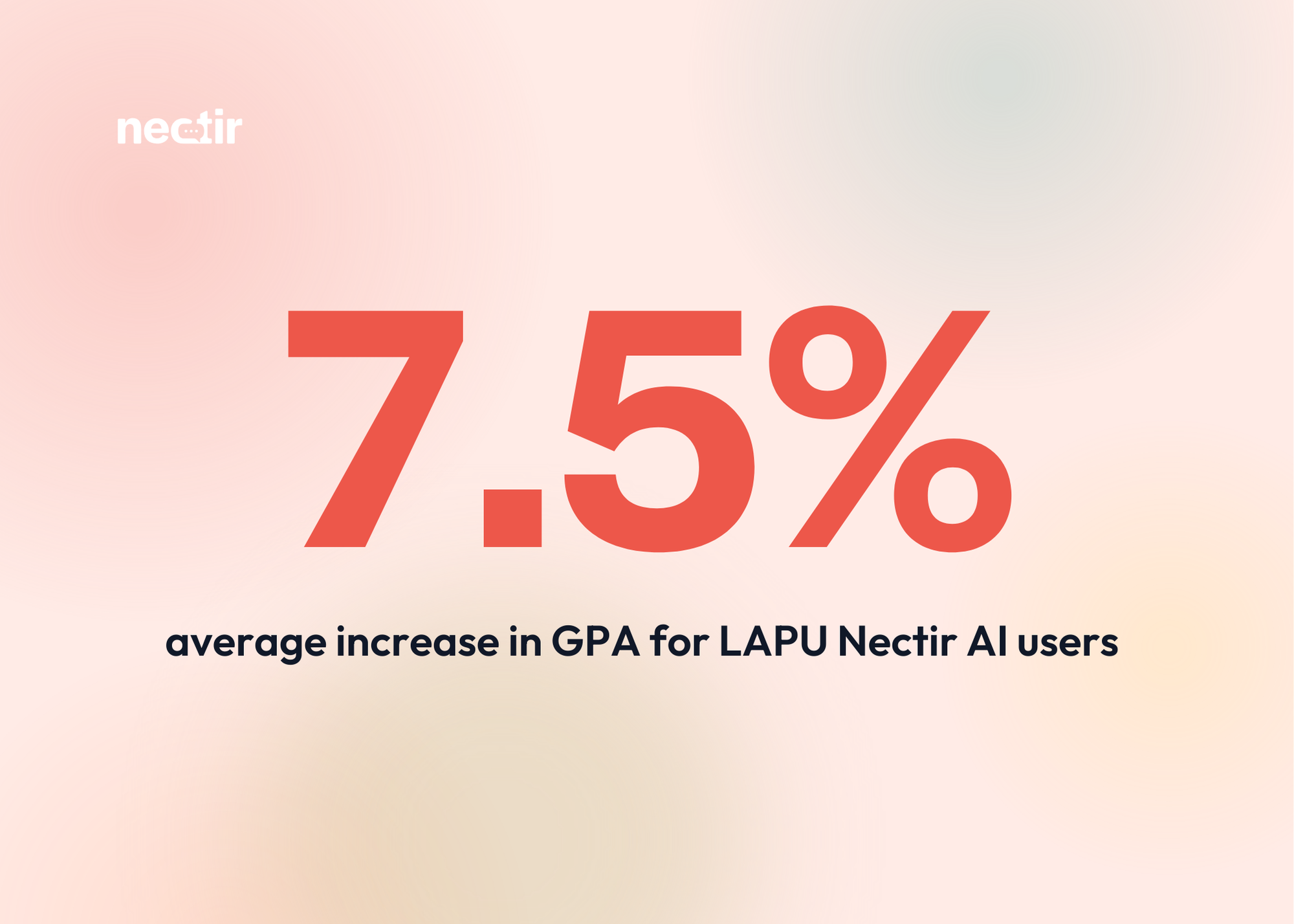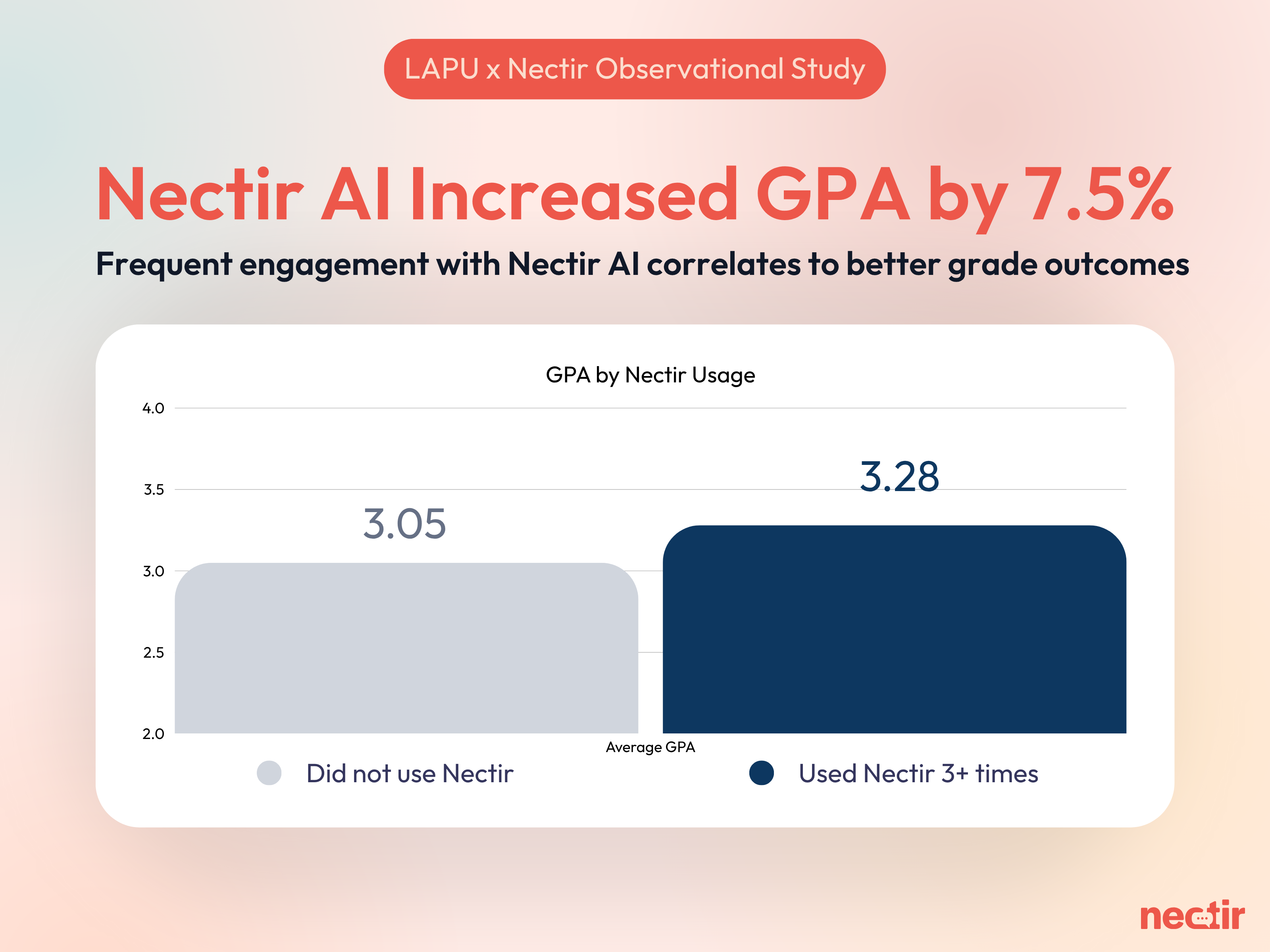How Los Angeles Pacific University Increased Student GPA by 7.5% (Peer-Reviewed Study)

Building AI for Every Learner
Artificial Intelligence has become one of the defining topics in education. Still, the pace of AI’s growth and adoption doesn’t come without its own well-deserved baggage of skepticism. If we aren’t intentional, AI runs the risk of widening the very gaps it claims to bridge.
At Nectir, we believe equity is a non-negotiable for effective AI in education. Every learner, regardless of background or resources, deserves the same opportunity to grow, ask questions, and succeed in an increasingly technology-driven world.
Our recent partnership with Los Angeles Pacific University challenged us to create and implement Nectir in ways that minimize the gap in education technology accessibility. While we’re proud of the steps we’ve taken, our journey is far from finished. Our latest research has shown both the promise and the ongoing challenge of making AI in education equitable.
We partnered with Los Angeles Pacific University to rigorously investigate whether AI course assistants actually move the needle when it comes to student success. The answer, we found, is a resounding, but nuanced, yes.
Why We Put AI to the Test
The industry is moving fast, but speed means little if we don’t pause to measure what works. So, we put Nectir to the test to find out if AI can help students improve their grades without giving them the answers.
Our study, published this week in Open Praxis, is one of the largest and most in-depth of its kind. It spanned over 2,000 course enrollments across 99 classes, focusing on student usage of LAPU’s GenAI course assistant, “Spark,” provided via Nectir technology.
As a fully online, asynchronous university, LAPU caters to full-time working adults, with more than half of its almost 1,900 students enrolled part-time. The challenges of online education made integrating AI course assistants even more important at LAPU. To combat the risk of limited real-time interaction and varying levels of support for students, Nectir AI provided immediate and personalized academic support, 24/7.
We didn’t set out just to prove our platform works. We wanted to share data, methodology, and limitations so the whole field can learn and improve.
Spotlight on What Matters

Here’s what we found:
- Students who engaged with Nectir AI three times or more saw meaningful GPA increases (and that held true after adjusting for differences in age, gender, and ethnicity).
- On average, student GPA increased by 7.5%.
- The study was conducted across four statistical approaches, and results consistently indicated that engagement led to significantly higher GPAs.
- The biggest gains didn’t come from one-off use but regular, active engagement. This means students weren’t just “logging in” but actively engaging with course concepts in dialogue.
- LAPU also trained and customized its Nectir AI assistant not to complete assignments for students. It guided students Socratically, leading with questions that fostered critical thinking and problem-solving skills.
Simply put, when students and faculty work hand-in-hand with AI—not as a shortcut, but as a partner—everyone wins.
Building for Inclusion, Not Just Innovation
In our study, not every LAPU student used Nectir AI, often due to issues with access or a lack of comfort with adopting new tools, raising important questions. Will these tools deepen the digital divide? What about student privacy, or the risk of undermining academic integrity? These aren’t just theoretical worries; they’re challenges that must be addressed directly.
Educational technology has a responsibility to lower barriers, not raise them. If we’re not careful, the digital divide can deepen, leaving the very students who could benefit most on the outside looking in. Here’s how Nectir is purpose-built to address these challenges for higher ed:
- Built with accessibility at the heart of the product. Nectir AI can integrate directly within the LMS so there’s no need for extra apps or confusing logins. At LAPU, we paired this with user-friendly training and in-course walkthroughs, reducing barriers for both students and faculty regardless of their prior experience with technology. This approach ensures all students—not just the most tech-savvy—can benefit equally, mitigating risks of inequity.
- Strict adherence to data compliance standards. Nectir AI’s customizability enables instructors to personalize their AI tools, not to do the work for students, but to foster deeper understanding and independent learning. Support and safeguards at every level help ensure AI in education drives positive outcomes responsibly, ethically, and for everyone.
Responsible technology means meeting every learner where they are and ensuring that innovation is a force for leveling the playing field, not reinforcing existing gaps. Equity should be a non-negotiable requirement for all edtech tools.
Where We Go From Here
This study is an important step, but it’s not the end of the conversation. Several challenges remain: How can we ensure that every learner can engage meaningfully with AI tools? How can we ensure that privacy and ethical guidelines keep pace with the rapid pace of innovation? Looking ahead, how do we track impact beyond GPA, but also student confidence, persistence, and skill growth?
If you’re interested in adopting an AI tool that’s safe, scalable, and stress-free, click here to book a Nectir AI demo today: https://www.nectir.io/contact/.
This research has been peer-reviewed and published on Open Praxis. For more detailed information about the study methodology and findings, please refer to the full research paper here.

